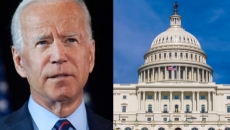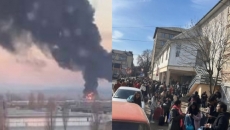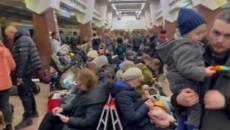The hottest month in recorded history is going out with a bang in the United States.
Much of the eastern half of the U.S. sweltered Friday in temperatures that felt as high as 44 C in population centres like New York, Kansas City and Washington, D.C, as July's oppressive "heat dome" drifted north.
The weather prompted the White House to make its second policy announcement on extreme heat in as many weeks, and a UN weather agency to proclaim it as the hottest month ever — before it was even over.
"Short of a mini-Ice Age over the next days, July 2023 will shatter records across the board," UN Secretary-General António Guterres told a news conference on Thursday.
"The era of global warming has ended," he said. "The era of global boiling has arrived."
Record high temperature are now affecting more than 100 million Americans.
— The White House (@WhiteHouse) July 28, 2023
The Biden-Harris Administration will continue to take action to help communities fight heat and keep families safe.
For more life-saving information, visit https://t.co/3TJomgAgGk. https://t.co/ZQHErH3qKz
The signals couldn't be more clear that people need to think differently about the weather, said Ashley Ward, director of the Heat Policy Innovation Hub at Duke University in Durham, N.C.
"At 30 days, we're not talking about a heat wave anymore. We're talking about a season. We're talking about a marker, a shift," Ward said.
"We're talking about a new chronic state of being for heat season. It isn't unreasonable to think this could quite possibly be the coolest heat season of our lives."
More than 150 million U.S. residents, nearly half the country's population, were under extreme heat alerts Friday.
The global mean surface air temperature for the first 23 days of July averaged 16.95 C, compared with the previous record of 16.63 C for July 2019. Climate action "is not a luxury but a must," said Petteri Taalas, the UN World Meteorological Organization's secretary-general.
In Phoenix, which has endured temperatures of 43 C or hotter for 27 straight days, emergency rooms are admitting patients for third-degree burns suffered after falling on the searing asphalt.
"Folks, we really want to pretend these things are normal?" President Joe Biden said Thursday as he met with the mayors of Phoenix and San Antonio to tout his latest efforts to help people contend with the conditions.
"The number 1 weather-related killer is heat. Six hundred people die annually from its effects, more than from floods, hurricanes, and tornadoes in America combined," he said.
And it's costing the country an estimated $100 billion a year, a price tag that's only going to continue to go up, he added.
"Even those places that are used to extreme heat have never seen it as hot as it is now for as long as it's been."
The measures the White House announced this week included a new Department of Labor heat hazard alert system to better warn construction and agricultural workers, and tougher enforcement measures to police their employers.
The Interior Department will spend $152 million to expand water storage and delivery systems in California, Colorado and Washington, where severe drought conditions are a chronic problem.
And the National Oceanic and Atmospheric Administration will get an additional $7 million to work with universities on developing better weather forecasting models to give communities more advance warning about extreme weather.
Not good enough, the National Council for Occupational Safety and Health complained Friday.
"Workers are getting sick and dying every day from the extreme heat driven by climate change," said co-executive director Jessica Martinez.
The group called on Biden to order an emergency temporary standard to better protect workers from heat stress, establish a more stringent permanent threshold for protections and urge states to impose their own rules.
"This is no time for modest steps."
Like a number of U.S. cities, Phoenix and San Antonio are expanding efforts to deploy so-called "cool pavement" surfaces that absorb less heat, part of an effort to ease the heat-island effect that occurs in urban areas.
San Antonio is also growing as a U.S. solar energy hub — the fifth-largest producer in the country, said Mayor Ron Nirenberg — and now requires 240-volt chargers for electric vehicles in all its new single-family homes.
"Sustainability and green energy are no longer four-letter words in the state of Texas," Nirenberg said.
Part of the reason long stretches of extreme heat can be so deadly is because they are insidious, Ward said.
Typically, parts of the country accustomed to summer heat, particularly in the southern U.S., have been able to cool off in the evening once the sun goes down, giving people a reprieve before the next day.
In many U.S. regions this year, however, that reprieve hasn't been coming, thanks in part to higher-than-usual humidity.
"We've seen some incredibly dangerous situations in the southeast where we've had these extreme temperatures during the day, but also a failure for the temperature to drop overnight," Ward said.
Several times so far this summer in Arizona, the overnight temperature has remained oppressive, often higher than 30 C. And even in parts of the country where the daytime temperature isn't as high, excess humidity makes it worse.
"This is — by far — one of the most dangerous circumstances, where we have both extreme temperatures in each part of the day," Ward said. "This is in fact the worst-case scenario for health outcomes."






